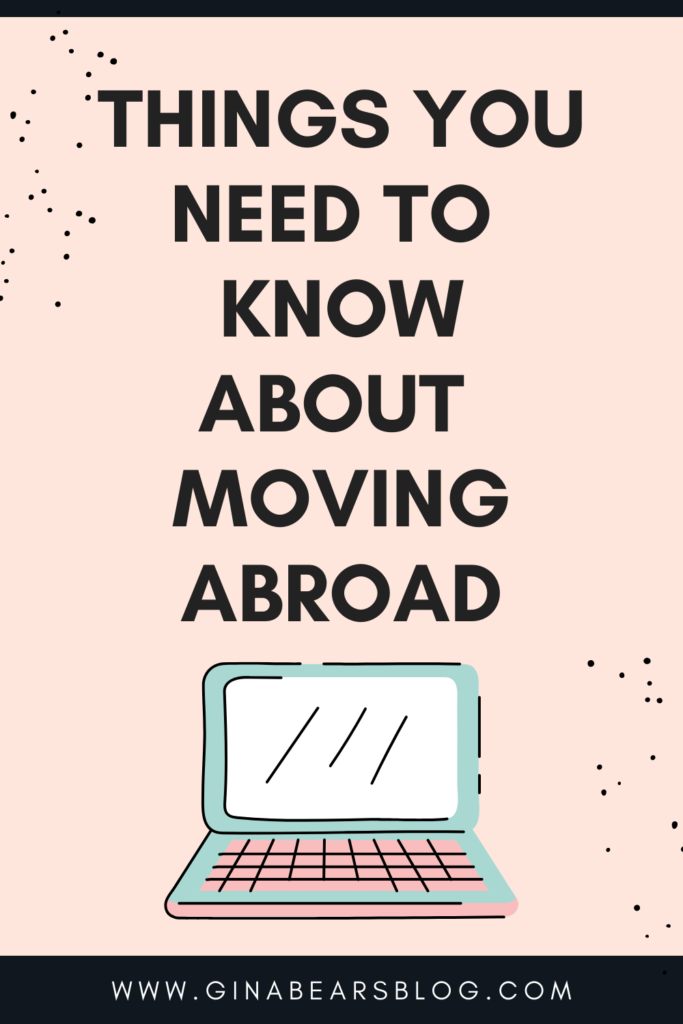Thinking about moving abroad? While moving to a new country sounds like an exciting and wonderful adventure, it can also come with it’s own set of struggles and burdens. As someone who lived abroad for eight and a half years, I know a thing or two and can impart on you some valuable advice. Some things you need to know about moving abroad deal with filing taxes, saving money, culture shock, finding a house and much more.
Table of Contents
Blog Posts You Might Like
- 75 Things No One Tells You About South Korea
- How To File Your Taxes While Abroad
- What’s It Like Living in Japan?
- What’s It Like Living in Korea?
- What To Bring When Moving to Korea
- Why I Left Korea
- Why I Prefer Living in Korea Over Japan
Know How To File Your Taxes
One of the most daunting tasks about moving abroad is that the law of your home country is that you still need to file taxes. While there are laws and regulations in many countries that prevent you from being taxed twice, you still have to report on your finances in your home country. I know how stressful this is when you reside in different time zones and you’re not 100% sure about the laws and regulations.
This is why I trust Taxes for Expats so much. They have served clients in 190 countries around the world and will make your experience a breeze. For over 25 years, they have made filing taxes for US expats abroad hassle and stress free. All you have to do is upload your paperwork and they take care of the rest. If you go through my Taxes for Expats Link here you can get $25 off your US Tax Return.
Filing taxes is stressful enough in your home country and it’s super daunting abroad. After finding Taxes for Expats, I felt confident my taxes were getting filed properly and the IRS wouldn’t come after me.
Please also note some important dates to note when filing your taxes. The date of filing a US tax return for most US citizens is April 15th. However, for expats residing abroad keep these important dates in mind:
- June 15th – US Citizens residing abroad get an automatic two month extension on their taxes.
- October 15th – You can request an automatic four month extension when residing abroad. You will just need to use Form 4868.
Taxes for Expats has many different packages to make sure your needs are being met whether you’re filing the first time or multiple years at once, they have you covered. If you’re interested, go through my Taxes for Expats Link for $25 off your first hassle free tax return.
Save As Much Money As You Can
This should be a no brainer, but you never know what costs you might have to pay for up front in a foreign country whether it be rent deposit money, a car, or furniture for your new home.
One of the biggest parts of moving abroad is the financial stress this can put upon the individual because they didn’t research the cost of living in their host country. I highly recommend checking out the world cost of living calculate on Expatisan.com.
How To Find the Right Home At the Right Price and Location
Where you live will play so much into your happiness and enjoyment abroad. Believe me, I lived in a poor and dangerous neighborhood with ratchet and shitty people. This really impacted the way I viewed Korea and one of the main reasons I chose to leave.
Living in a good, well-lit, and newer area will guarantee your safety and those who might be moving abroad with you. You also need to ask yourself:
- What are the housing costs?
- How do I buy/rent a home?
- What household appliances and things do I need?
You also need to be aware that sometimes getting a home is something you cannot do alone and you will have to go with a coworker or friend in your host country to help you shop around.
How To Build A Support Network
While most people are worried about money, location, and logistics, they often forget about one of the most important parts of living anywhere—a support network.
When you’re at home in your native country, you have a lot of support be it financial, emotional, or physical support from your close friends and family. We don’t realize how important this is until we lose it.
Living abroad causes a lot of expats to:
- miss their family and friends
- feel super lonely
- feel frustrated trying to make new friends
- feel sad about the general lack of support
I would know about all of the above because I recently just repatriated from South Korea. The best way to build a support network abroad is actually to join Facebook groups. There are lots of groups in regards to your hobbies, mom support groups, dad support groups, and even expat support groups. In these groups, you can reach out and try to meet new people. There’s also a website called meetup.com that you can set to your location and similarly find meetups based on your hobbies and interests.
How Will You React To the Culture and Assimilate?
I highly recommend visiting the country you plan on living in before you even decide to live there. Think of it as a test drive for a vehicle at the DMV. Try it before you buy it. Moving abroad is a huge commitment. You better get a feel for the country and culture no matter how small before you go there.
One of the biggest culture shocks a lot of expats have is about language. A foreign language is never easy to learn and believe me, it feels wild from being illiterate and advanced in your own language to not knowing a single thing. It can be very overwhelming.
Similarly, there will be things about your host country that you’ll really appreciate and others you will absolutely hate. For instance, one of the things I hated most about South Korea and Japan was how conservative they were in regards to the way women should act and dress.
It’s also important to know the different stages of culture shock such as the honeymoon stage, frustration stage, adjustment stage, and last acceptance stage. Although fair warning, the longer you stay, the more you learn about the culture, and the more you realize culture shock isn’t just a one and done, but an ongoing thing.
When you move abroad you need to ask yourself some important questions because religion, politics, and culture play a huge role in your comfort of living abroad.
- What is the dominant religion and how does this impact the country’s population?
- What is the most used spoken language and how do you learn key phrases quickly and efficiently?
- What is considered polite etiquette?
- What are the social cues, what do they mean, and what are the local holidays and customs?
- What is the political system and climate?
- What are the current events?
- How are citizens of your country viewed in your host country?
How This Will Affect Your Career and Future Job Prospects
Depending on your job field, this can really affect what will happen to you once you return to your home country. I once had a friend in IT who left Japan after two years because if she stayed away longer, she’d have trouble going back into the field because so many things have changed. If there’s a time limit to going back and jumping back in, I highly recommend you stick to it and don’t dawdle.
I’d been abroad eight and a half years and I know the job market prospects aren’t that great for someone who hasn’t gotten any US experience. I would have to go back to school for a masters, probably do an internship, and then maybe get a job. Luckily, I’ve chosen to make my own career online so I don’t have to worry too much about this. Working online is also the future of the job market and the Covid-19 pandemic has changed the way we work forever. Also keep this in mind if and when you decide to transition back.
However, if you’re in a different field, you might want to research what will happen if you do choose to come back after awhile abroad and what will happen when you do try to get back into the US job market.
How the Weather Will Affect You
Seasonal Affective Disorder (SAD) is a real thing. This disorder is characterized by feeling sad, moody, and lethargic around the same time of year during the winter. If you’re used to living in a warmer climate that is warm all year long, then you’re definitely going to be feeling it when the snow and rain come.
Alternatively, if you come from a cooler climate and move somewhere warmer then you’re definitely going to have to learn how to navigate those temperature changes.
Know the Law
Every country has their own unique laws and societal expectations. What may be perfectly legal in one country may be illegal in another.
For instance, while I was living in Korea, there were hardly any self-defense laws for Koreans and virtually none for foreign residents. This means if a Korean decided to attack me, I would have to just take it if they hit me and then run away because if I choose to defend myself, that would make me liable for the other party to sue me. How messed up is that?
Another example would be defamation laws. While in America, you’re mostly free to slander and hurt people online without any consequences, that is not the case in Korea. If you say this business did xyz, even if it is true, the business can then turn around and sue you for defamation and causing them to lose profit.
In addition, if someone commits a crime against you and you name your attacker, that attacker can also sue you, the victim for defamation.
It’s best not to assume that your country’s laws and protections will be afforded to you in your new home in a foreign country. You can check the local laws of your host country here.
How To Navigate Foreign Healthcare Systems
Our healthcare system in America is vastly different compared to those in Korea and Japan. One major difference is that if you get hurt, you will not go into debt or go bankrupt from going to the doctor.
As a matter of fact, many countries around the world have socialized healthcare and guarantee their citizens health without any worries. This is something America is really bad at and I think needs desperately to change.
Also, while America mental health is covered under a lot of insurance policies because of the cultural stigma and taboo about mental health in many Asian countries, it is considered a luxury and not covered by insurance. If you are an expat abroad and seeking mental health experts, I really recommend going through the online counselor service platform Betterhelp. They matched me with my counselor Dave and he has been amazing with helping me navigate through tough times and previous issues.
When moving abroad you need to ask yourself these questions:
- Does my job cover healthcare?
- What healthcare expenses do I need to pay from my own pocket?
- How does culture play a part in the care I’m given?
In addition, if you have preexisting conditions are their doctors that specialize in the care and medicine you need?
How To Deal With Traffic and a New Commute
Sometimes you’re going to need to purchase a car to get to work. Maybe you’ll be living in a city where there’s good public transport and you need to learn how to navigate there. Perhaps your host country uses different app or map services to navigate and you’re going to have to learn to use those. Or maybe if you work remotely, you’ll need to find a shared co-working space.
Also, you may have to keep in mind different countries may drive on the opposite side of the road and this could be incredible nerve-racking for you to drive on. Make sure to give yourself the space and time to adjust to these changes as well.
Make sure you also study the rules of the road in your new foreign country and what different signs can mean. You can check out the US Travel State Department Driving page in order to see more specific country rules and regulations.
There are many things to consider when moving abroad to a foreign country. You will be faced with new challenges such as assimilating to a new country, language, climate, and culture. You’re going to be put in an uncomfortable and frustrating position. My best advice is not to go in with expectations, do your research on your host country, and try to make the best of what life has given you. And yes, that means if you get lemons, sweeten them up in lemonade.
This blog post was sponsored by Taxes For Expats. Gina Bear was able to test out their services in exchange for this blog post. As always, all thoughts and opinions remain my own.



Free Seoul E-Book
Do you love South Korea?
Enter your name and email address and click the button below to receive your Easy Seoul Travel Guide so you can travel like a local!






